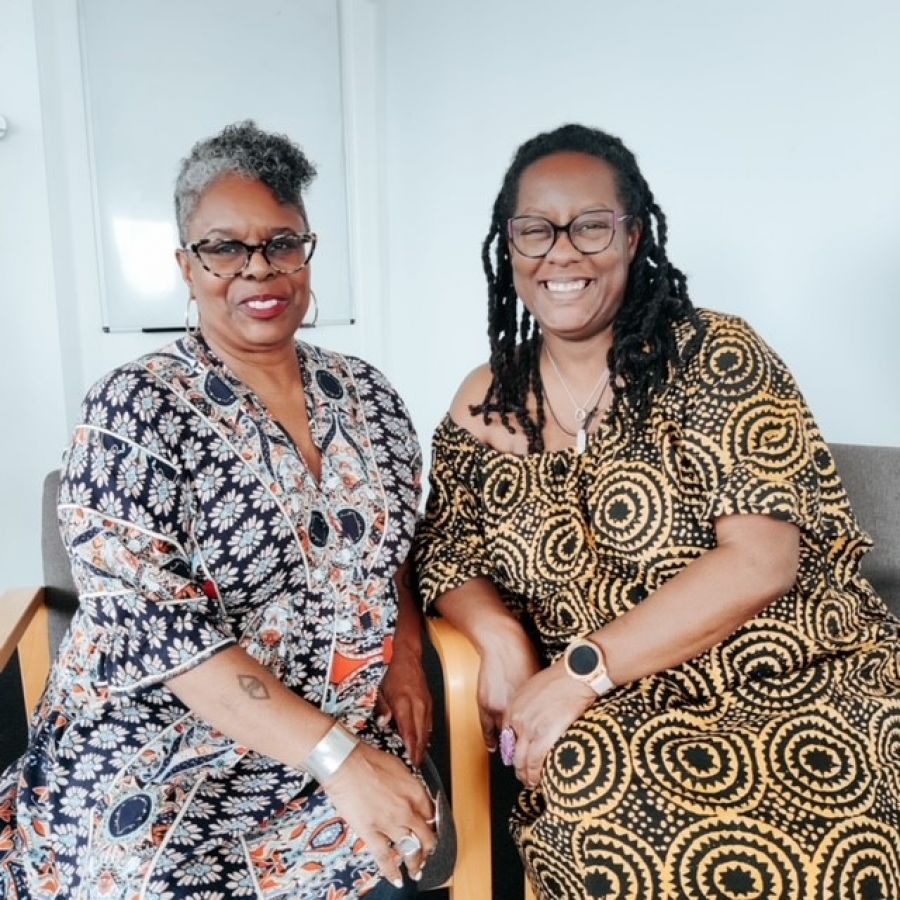Pregnancy, Race, and Reproductive Justice workshop
Media
Image

Media description
Professor Dána-Ain Davis (left) and Mars Lord (right) sit smiling for the cameraBlog content
‘I am Mars. Not the chocolate bar, Mars the goddess.’ Introducing herself unapologetically to an audience of researchers, birth workers and charity professionals, doula Mars Lord opened the workshop on pregnancy, racism and reproductive justice at the Edinburgh Centre for Medical Anthropology organised by Dr Lucy Lowe on May 12th 2022. Mars Lord and Professor Dána-Ain Davis, an anthropologist from the City University of New York, held a conversation about the disproportionally high mortality and morbidity amongst Black pregnant people and their babies both in the US and the UK. As practicing doulas and birth activists, both Lord and Davis brought with them their everyday understandings of the injustices faced by Black pregnant people, and the consequences of racist healthcare for Black families in both countries. Contrary to news articles and social media tweets, Lord insisted that the racialised healthcare system is not “in crisis” but that the way Black people are treated within maternity care is a scandal given the historicity of racial inequality.
The discussion ‘Where is the danger?’ for Black women in maternal health care was followed by a two-hour conversation between Lord and Davis, and later, with the audience. Having worked with Black mothers and in the NHS and US healthcare system for more than two decades, both speakers highlighted how Black people receive less care, within what Professor Marian Knight has called a “constellation of biases” (Knight et al 2022). In the UK, Black women are four times more likely to die in pregnancy and birth (Knight et al 2021). Their babies are twice as likely to die in stillbirth, and a staggering 45% of infants are more likely to die in the first 40 days after birth (Draper et al 2021). Only recently, the Ockenden report into the deaths and birth injuries of babies born between 2000 and 2019 in the Shrewsbury and Telford NHS Trusts in the UK has renewed a conversation around care and the use of interventions (see Ockenden et al 2022). In particular, the report highlights the neglect to listen to and act upon parents’ concerns during pregnancy, as well as during and after birth. Lord pointed out that there has never been a review such as the Ockenden report into Black people’s mortality and morbidity in maternity services in the UK.
From my own research into pregnancy loss in the Lothians, Scotland, I know that data on pregnancy loss, especially before the 24th week of gestation, is sparse and there is barely any data on parameters such as race. A recent special issue of the medical journal The Lancet titled ‘Miscarriage Matters’ highlights that data on miscarriages and early losses by ethnicity is lacking. In fact, the UK does not collect national statistics on early pregnancy losses, though a comparative literature research undertaken as part of the ‘Miscarriage Matters’ series showed that Blackness is associated with a higher chance of miscarriage (Quenby et al 2021). ‘We’re too black.’, Lord diagnosed. Davis added that Black bodies exist on a continuum of purported immunity, leading to excessive neglect, and susceptibility, which in turn bring about excessive intervention. One example of this is the recent recommendation (retracted a few weeks later) by the National Institute for Health and Care Excellence (NICE) to induce Black and Brown women at 39 weeks preventatively, to decrease maternal and neonatal morbidities and deaths, as opposed to a recommendation for induction at 41 weeks for White women (Torjesen 2021).
The gap filled by birth workers such as doulas, who often also engage in political and everyday activism on behalf of their clients and community, was the second focus of this workshop. Lord’s own Abuela Doulas is the first UK-based? doula training course and platform founded and created by a Black woman, engaging generational knowledge of pregnancy, birth and the postnatal period, and the intersection of birth support and activism. Davis pointed out that this duality of doula work is not new, with different variations of mutual aid and maternity care evident in historical social and community groups such as the Black Panthers Survival Program. As such, the advocacy and value of Black birth workers’ labour need to be part of feminist analysis, Davis urged, andhe emotional labour of Black birth workers, as well as Black pregnant people and their partners, needs to be considered. The founder of the LGBTQI+ pregnancy loss charity The Legacy of Leo described her exhaustion in a post in 2020, stating that the ‘decade of public grief and of the advocacy that followed is enough for me… my voice and the anger that fuels it need a break.’.
For me, as a researcher, this means to take into the account the emotional labour and burden of my participants and to recognise that writing on their behalf is to share a small fraction of their advocacy and their grief. There is absolutely no doubt that more research and more advocacy is required to address the racial divide in maternal healthcare in the UK and US. Mars Lord and Dr Dána-Ain Davis are Black women doing that work in the community, in the healthcare and policy sector and in academia. Their call at this workshop was not for White allies to step in, but for the scandal of Black maternal health to be realised and recognised by a broad spectrum of people. The burden of knowing and caring cannot be shared equally, but it can be shared. The grassroots campaign Five X More provides resources, advocacy and research committed to improving maternal health care for Black pregnant people and is a good place to start reading. I recommend following Mars Lord on her social media (@_marslord), and to check out Dr Dána-Ain Davis’ work, especially the formidable, US-based ethnography Reproducing Injustice: Race, Pregnancy and Premature Birth (2019).
Tara Pollak is a PhD in Social Anthropology at the University of Edinburgh researching pregnancy loss, bereavement and kinship in the Lothians, Scotland. Her ethnographic research project ‘Reproducing Loss’ is funded by the ESRC. More info about Tara and her research can be found on her University page or project website.
Resources:
Davis, D. 2019. Reproducing Injustice, Race, Pregnancy and Premature Birth. New York: NYU Press Scholarship.
Draper ES, Gallimore ID, Smith LK, Fenton AC, Kurinczuk JJ, Smith PW, Boby T, Manktelow BN, on behalf of the MBRRACE-UK Collaboration. 2021. MBRRACE-UK Perinatal Mortality Surveillance Report, UK Perinatal Deaths for Births from January to December 2019. Leicester: The Infant Mortality and Morbidity Studies, Department of Health Sciences, University of Leicester.
Knight M, Bunch K, Tuffnell D, Patel R, Shakespeare J, Kotnis R, Kenyon S, Kurinczuk JJ (Eds.) on behalf of MBRRACE-UK. 2021. Saving Lives, Improving Mothers’ Care - Lessons learned to inform maternity care from the UK and Ireland Confidential Enquiries into Maternal Deaths and Morbidity 2017-19. Oxford: National Perinatal Epidemiology Unit, University of Oxford.
Knight, M., Bunch, K., Vousden, N., Banerjee, A., Cox, P., Cross-Sudworth, F., … Kurinczuk, J. J. (2022). A national cohort study and confidential enquiry to investigate ethnic disparities in maternal mortality. EClinicalMedicine, 43. https://doi.org/10.1016/J.ECLINM.2021.101237
Ockenden, D. 2022. Ockenden Report- Final: Review of Maternity Services. Retrieved from www.gov.uk/official-documents (Accessed 22/05/2022)
Quenby, S, Gallos, ID, Dhillon-Smith, RK, Podesek, M, Stephenson, MD, Fisher, J, … Coomarasamy, A. 2021. Miscarriage matters: the epidemiological, physical, psychological, and economic costs of early pregnancy loss. The Lancet, 397(10285), 1658–1667. https://doi.org/10.1016/S0140-6736(21)00682-6
Torjesen, I. 2021. ‘NICE backtracks on advice to induce labour at 39 weeks in ethnic minority women’. BMJ, 375 (2703). https://doi.org/10.1136/bmj.n2703
